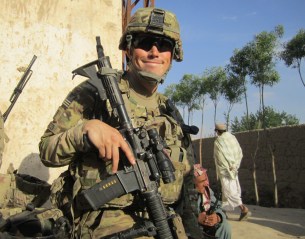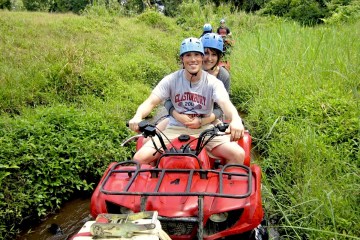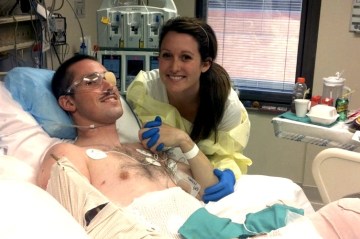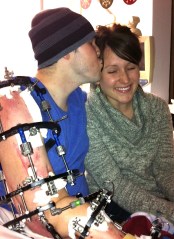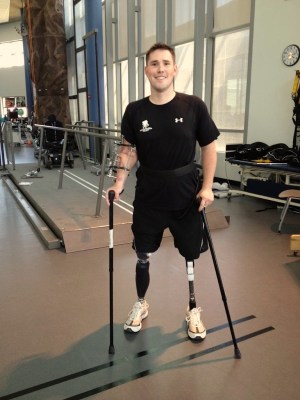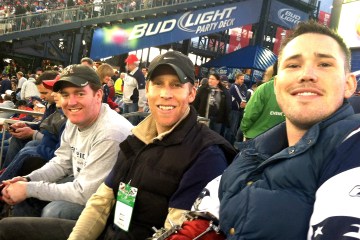Summer Buckley and Gregory Galeazzi in San Diego in October.
Army Captain Gregory Galeazzi and community activist Summer Buckley have a romance made for Thanksgiving.
It began in July 2010, when Greg, 27, was visiting Washington, D.C., two weeks before a year-long deployment to Afghanistan. He met Summer, 25, at a bar in the capital’s Adams Morgan neighborhood.
“It was one of those things where you were like, ‘I’d really like to pursue something with you, but I’ve got to go,’” he recalls. “So we said that we’d exchange emails, phone numbers, and said we would write to each other. I didn’t think it would go anywhere, but it wouldn’t hurt to try.”
It was a chance meeting that would change their lives.
The next weekend, Summer, from Tucson, Ariz., was traveling to Seattle to visit her grandparents, when her connecting flight in Denver got cancelled. She remembered that Greg, an Army Ranger from Glastonbury, Conn., was stationed at Fort Carson, near Colorado Springs. “I think I texted him,” she says. “I was too chicken to call.”
He drove 90 minutes to spend the day with her. “We were both such rational people,” Summer says. “We had nothing to lose because nothing was ever going to come from it.”
Her grandmother knew better. “What a soldier!” she exclaimed after Summer explained her Colorado delay. “You should have just stayed the whole weekend!”
Summer decided to visit Greg one last time in Colorado Springs shortly before his first deployment to Afghanistan. “We went hiking, met friends, relaxed. We were both like, what the heck are we doing?” she says. “We are never going to see each other again.”
After arriving in Afghanistan in July 2010, Greg began pulling security at the Kandahar governor’s palace in the violent southeastern part of the country. Less than a month into his tour, he got word that an infantry platoon had lost its leader and staff sergeant in an IED explosion. He was ordered to fill the gap.
“I got a call saying the commander was on his way to pick me up and I had three hours to pack my stuff and get ready,” explains Greg, who had led another platoon in the same battalion back in Colorado.
Then they were ordered north. “It was supposed to be for only 72 hours. Seventy-two hours turned into a week, and that turned into four months,” Greg says. “I wasn’t able to email with Summer, I wasn’t able to Skype with her. We’d handwrite letters sometimes, but they would just get piled up in a bag.”
Summer’s weekly letters kept coming. “I was just torturing myself reading these letters,” Greg says. “I eventually wrote her a letter that something like, `We are just lying to ourselves, this isn’t going to work.’”
While she thought he might change his mind later, Summer agreed to put things on hold. “He was right,” she says. “You have to support that—he’s in war. Who knows what he is seeing and going through?”
On Christmas Eve, 2010, Summer was watching the movie The Christmas Story with her mom in Tucson when Greg called. “He was sitting on top of a roof in 30-degree weather to get reception to call me,” she says. He was slated for two weeks of mid-tour R&R leave in February, and wanted to know if she’d head to Costa Rica to meet him there. She was surprised to hear herself saying “Yes.”
In hindsight, they made lifetime memories together in Costa Rica. But they parted after just a week. “I dropped her off at the airport, and said goodbye,” he remembers. “As soon as she disappeared out of my view, I realized that I had fallen in love with her.”
Three months later, Captain Galeazzi’s world changed for keeps.
He was on a routine foot patrol in Kandahar province on May 26, 2011. “About six to eight hours before my patrol, I was Skyping with Summer. We were talking and getting excited–I was coming back in just a month. She told me she had picked out a dress she was going to wear to the welcome-home ceremony,” Greg remembers.
This whole time I knew I loved her, but I didn’t want to tell her over Skype–I wanted to tell her in person.
Hours later, the IED exploded under him:
I felt like I was en empty soda can that got hit by a freight train. I felt myself hit the ground, but I was trying to get up, and I couldn’t. I was kind of expecting to see a big cut on my leg or a broken leg—but nothing could have prepared me for the nauseating and heart-sinking feeling that my legs were gone. They were nowhere to be seen.
His right arm was nearly torn off. He was drifting into shock, and had time to only tell his soldiers his computer password, so they could send the email he had written for Summer if he didn’t make it.
But he did. Greg awoke several days later in Brooke Army Medical Center in San Antonio, Texas. “My brother and brother-in-law were in the room,” he recalls. “They told me Summer was here.” She had just met Greg’s family for the first time while he was still unconscious.
The first thing I told her was that I loved her. And then I said, we barely know each other and married couples don’t even make it through this, so I wouldn’t hold it against her if she didn’t want to stay. She told me that she loved me too.
Summer quit her job in D.C. for an international development nonprofit, and stayed with Greg in Texas until October. Seeing wives caring for husbands with similar injuries took its toll. “It freaked me out, it freaked Greg out,” she says. “I guess we are not young in the military sense of when people get married, but I consider us both really young. It was intense.”
“Neither of us wanted to leave each other,” Greg says. “But from my standpoint, I didn’t want to be the reason why Summer couldn’t do the things she wanted to do in life—travel, I know she wanted to go to Haiti and Africa and Cambodia and do humanitarian relief there.”
So last October, they decided they would try a long-distance relationship. Summer returned to Washington, D.C., and visited Greg every few weeks at Brooke as he mended. Last week, just in time for Thanksgiving, Army doctors told Greg his right arm had healed enough that he will soon be able to take off the arm brace that he has worn for 13 months. Next year, following still more surgeries, Greg hopes to move back to the East Coast near Summer and his family. “We can’t wait the day when we can cook dinner on a Sunday,” Summer says, “and watch Dexter on TV and have a new normal.”
Greg is thankful. “My family and my girlfriend have been more supportive than you could ever dream,” he says.
So is Summer. “For me it doesn’t matter what physical loss Greg has had. He is here,” she says. “He is still Greg, the person who I met who is so loving and caring and smart. He is still the person I get to spend Thanksgiving with.” She pauses. “It took a long time to get him.”
But Greg wants to thank you, too:
I’ve talked with a lot of Vietnam vets, and the things that stand out to them are that when they came back from Vietnam, no one wanted to associate with them, people spit on them and held signs calling them “baby killers.” As soldiers, we are not the ones starting these wars—[we do] what we are told to do when we are told to do it. For me to come back today and have so many organizations out there to support us and thank us and support my family…Last weekend I went to New England for a Patriots game. The Patriots organization hooked me and my friends up with field passes. They introduced me to [Patriot stars] Rob Gronkowski, Tom Brady, and guest of honor Henry Kissinger [not a Patriot star]. For them to shake my hand and thank me for my service—it was so genuine. On the flight back, I went to check in at the desk, and some guy came up and said, “I hear you don’t have a first-class ticket. I’d like to give you mine.” I am sure there are people out there who don’t understand. I think those people don’t have a clue as to the bigger picture. I’m thankful that as a nation we take care of and show our support for all the men and women who have raised their right hand to protect this country.
Of course, Greg and Summer’s tale is only one story. But they are hardly alone. On Thanksgiving Day, they’ll be sitting down to dinner with family in Arizona, just like most of the 1,300 other U.S. troops who have suffered major amputations in the wars in Afghanistan and Iraq.
And that gives you something to be thankful for, too.


